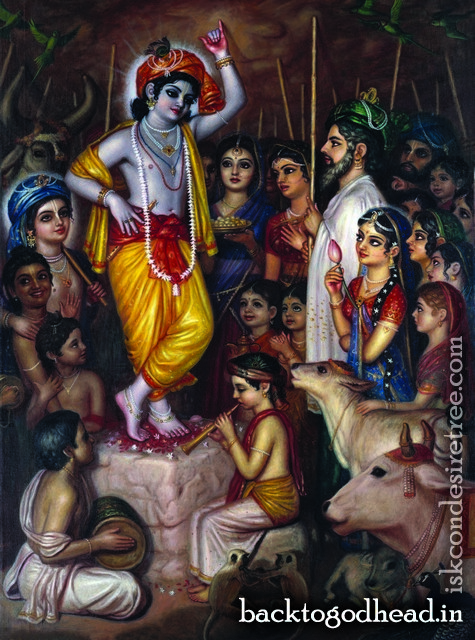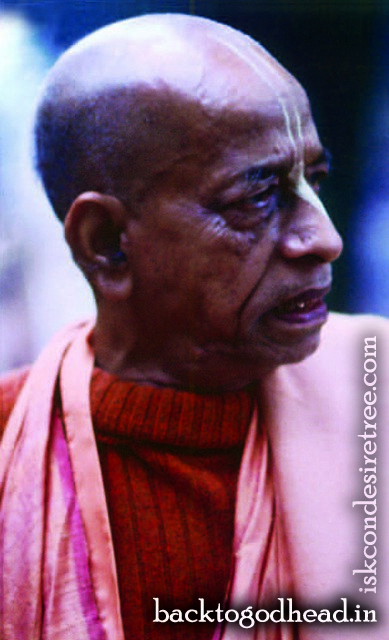kim tad brahma kim adhyatmam
kim karma purusottama
adhibhütam ca kim proktam
adhidaivam kim ucyate
“Arjuna inquired: O my Lord, O Supreme Person, what is Brahman? What is the self? What are fruitive activities? What is this material manifestation? And what are the demigods? Please explain this to me.”Bhagavad-gita 8.1
These are th e subjects of knowledge. First Arjuna asks, kim brahma: “What is Brahman?” Brahman means the biggest. It is already the biggest, but it is still increasing. That is called brahman. For example, this universe is already the biggest, but it is increasing. Modern science says that the universe is increasing.
In our Vaisnava philosophy, “the biggest” means Krishna, because He is the richest, the strongest, the wisest, the most beautiful. In these ways He is the biggest. If a man is very rich, we consider him the biggest man in society. But nobody can hold all the riches of the world. Only Krishna can. Krishna has all the riches of the world. Sarva-lokamaheSvaram [Bhagavad-gita 5.29]. Krishna says, “I am the maheSvaram, the supreme owner of all the planets.” Actually Krishna is Parabrahman; He’s not only Brahman but Parabrahman, the Supreme Brahman. That is accepted by the authorities.
Kim adhyatmam. atma means the body, the self, or the mind. But Arjuna is asking, “What is the real meaning of atma?” atma means the soul. You are atma, and I am atma. Every one of us is a minute particle, part of Krishna.
Kim karma. Karma means to work. That is material. Working is required in the material world. Without working you cannot get anything. Here you have to keep your body and soul together.
Therefore you have to work. Work can be divided in different ways, but one has to work. One may work as a brahmana, one may work as a ksatriya, or one may work as a vaiSya or a Südra. In Vaikun†haloka, the spiritual world, you can live eternally without working, without endeavor. Vaikun†ha means “without anxiety.” Here we are full of anxieties.
Purusottama. Arjuna addresses Lord Krishna as Purusottama uttama-purusa. Purusa means the male, or the enjoyer. There are three kinds of purusa: uttamapurusa, madhyama-purusa, adhamapurusa. Adhama means the lowest. We are also purusa. At least, we have taken the position of purusa to enjoy the material world. But we are adhama-purusa. Again, adhama means the lowest. We cannot enjoy independently. We require so many favorable circumstances. For example, we cannot see without the sunrise. Still, we are very proud of seeing. We say, “Can you show me God?” Well, can you see God? You cannot see without sunshine, and still you are so proud of your eyes.
Krishna is the Purusottama, the uttama-purusa. The madhyamapurusa is the Supersoul. He is between Krishna and us in status.
Adhibhütam: the five elements of matter. Arjuna wanted to know everything from Krishna. He accepted Krishna as the spiritual master, the authority. Unless you accept that someone is quite fit to become your authority, he cannot be your spiritual master. You must be satisfied by the authoritative statements of the spiritual master. You cannot argue. That is the principle of authority.
Adhidaivam: the demigods. The demigods control the universal affairs. For rain, the demigod known as Indra is in charge. For heat and light, the demigod Süryadeva is in charge. Candradeva, the moon-god, is in charge of activating the vegetables. All these demigods have power invested in them by the Supreme Personality of Godhead. They are agents. They are called demigods. There are thirtythree crores of demigods [crore = ten million], and they control our activities also.
Now Text 2:
dehe ’smin madhusüdana
prayana-kale ca katham
jñeyo ’si niyatatmabhi˙
Sri-bhagavan uvaca
aksaram brahma paramam
svabhavo ’dhyatmam ucyate
bhüta-bhavodbhava-karo
visarga˙ karma-samjñita˙
purusas cadhidaivatam
adhiyajño ’ham evatra
dehe deha-bhrtam vara
“Bhagavan replied: The indestructible, transcendental living entity is called Brahman, and his eternal nature is called adhyatma, the self. Action pertaining to the development of the material bodies of the living entities is called karma, or fruitive activities.

“O best of the embodied beings, the physical nature, which is constantly changing, is called adhibhüta [the material manifestation]. The universal form of the Lord, which includes all the demigods, like those of the sun and moon, is called adhidaiva. And I, the Supreme Lord, represented as the Supersoul in the heart of every embodied being, am called adhiyajña [the Lord of sacrifice].” [Bg. 8.3–4]
Remembering Krishna at Death After explaining all these items adhibhütam adhiyajñam, the Supersoul, the material creation, Purusottamathen Krishna says [Bg. 8.5]:
anta-kale ca mam eva smaran muktva kalevaram ya˙ prayati sa mad-bhavam yati nasty atra samSaya˙
This is the ultimate end of Krishna consciousness. Anta-kale: “at the time of death,” “at the end of life”; ca mam: “unto Me”; eva: “certainly”; smaran: “remembering.” Deity worship is especially meant for this purpose. If you go on worshiping the deities of Radha and Krishna, naturally you’ll be practiced to think of Radha-Krishna always within your heart. That practice is required.
Anta-kale ca mam eva smaran muktva. By remembering Krishna at death one gets mukti. Mukti means to get no more material bodies. We are now conditioned by our material body. In the material world, we are changing one body after another, but there is no mukti, no liberation. Mukti doesn’t come simply by changing the body. Mukti means to change this body and not accept any more material bodies but to remain in our own spiritual body. It is like recovering from a disease and regaining your original healthy body. It is not that mukti means to become formless. No. The same example: You are suffering from fever. To become free from fever does not mean that you become formless. Why should you become formless? Your form is there, but it is no longer disturbed by fever. Similarly, a snake gives up its skin, but it remains in the body. It gives up the extra covering it has grown.
I have my original body already, but it is covered by this material coat, this body. When there is no more material coat, that is called mukti. That can be achieved when you go to Krishna, back home, back to Godhead. At that time you do not become formless; your form remains. As I have my individual form, Krishna has His individual form. Nityo nityanam cetanaS cetananam [Ka†ha Upanisad 2.2.13]: Krishna is the chief of all living entities.
You can have mukti if you can remember Krishna at the time of your death. That is possible. If we are practiced to think of Krishna always, naturally at the time of death we will think of Him. If we are so fortunate that we think of KrishnaHis formthen we become materially free. No more material bodies. That is Krishna consciousness. We must practice.
To Krishna Without a Doubt
Here it is said, ya˙ prayati sa madbhavam yati. Mad-bhavam means the spiritual nature or spiritual world. This world is also Krishna’s world, but this is not the spiritual world. This is the material world. We have already discussed that Krishna has two energies, material and spiritual. The material world is the manifestation of Krishna’s material energy. He has a spiritual world also, because spiritual energy is also one of His energies. Because Krishna remains in the spiritual world, He says mad-bhavam, “My spiritual nature.”
This is the simple process. Yati: “He goes.” Na asti atra samSaya˙: “Do not doubt it.” If you have taken Krishna as the supreme authority and Krishna says there is no doubt about it, then why should you become doubtful? Why should you disbelieve Krishna? This is the process: Chant Hare Krishna; always remember Krishna. Death may take place at any time. There is no guarantee that you’ll die only after so much time has passed. At any moment you can die.
There is no guarantee about when you will die. But it is guaranteed that you must die. That is guaranteed. Therefore we must be prepared for death at any moment. A devotee is not afraid of death.
Death may come at any moment. Nowadays, death is very cheap. We are using cars, airplanes, ships, and other things for transportation, and at every moment there is danger of an accident occurring. So we must be prepared for death at any moment. There is no guarantee: “I am not yet old enough. I am not yet eighty years old, ninety years old. Why shall I die?” No. You may be twenty years old, twenty-five years old, or younger than that. Death is assured, and it can take place at any moment.
Therefore our only duty is to think of Krishna, Purusottama, so that if we die at any moment we attain spiritual salvation. That is our only duty. We have no other duty but to remember Krishna twenty-four hours a day. That is the greatest process of yoga perfection. Yoginam api sarvesam mad-gatenantar-atmana [Bg. 6.47]: “The first-class yogi is the one who is always thinking of Me.”
The Hare Krishna maha-mantra is so nice that as soon as you chant Hare Krishna you remember Krishna. Go on chanting; that means remembering. While chanting, if there is death and I am remembering Krishna, what is my fear? I am going to Krishna, back home, back to Godhead. It is so nice.
Always be engaged in Krishna consciousness. Chant the Hare Krishna mantra. Then you are sure and safe in this life, and you are going home, back to Godhead. It is such a nice thing.
Thank you very much.

